In Conversation: Cooper Biggar on Reactor Operations at McMaster University
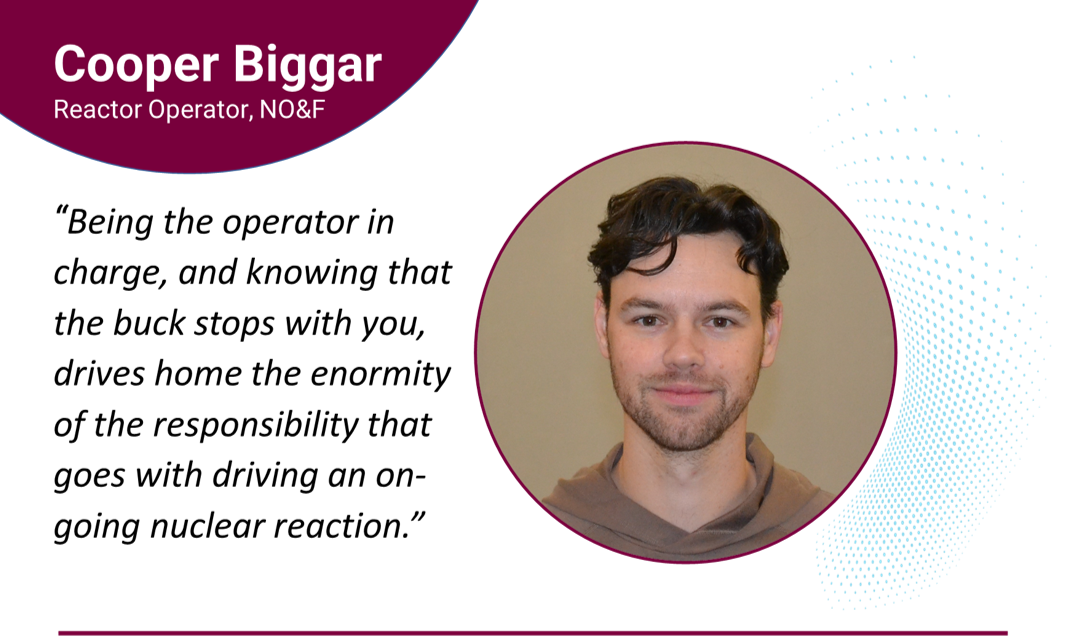
Have you ever wondered what it’s like to operate a nuclear research reactor? Cooper Biggar, a licensed Reactor Operator at the McMaster Nuclear Reactor, sat down with NO&F scientist Matt Moran to share his perspectives on getting into the nuclear sector, what he likes best about his job, and his career highlights so far.
What is your role at Nuclear Operations and Facilities?
I’ve been a Reactor Operator at the McMaster Nuclear Reactor since 2017. That said, I was technically hired on as an Assistant Operator. It took me almost two years to become certified. So, I have only been a licensed operator since 2019.
Two years?
Well, yeah. Nuclear is one of the most heavily regulated industries in the world. And for good reason. There is training we follow around engineering physics, site-specific training, and safety training, as well as learning all of the day-to-day tasks of the role. It culminates to where you are the sole operator in charge [of the nuclear reactor], with a minimum number of hours in that role. Kind of like becoming a pilot. Part of the on-the-job training was the Reactor Supervisor taking you around and questioning you for hours about all aspects of the facility. Then there are the unit tests along the way, as well as a six-hour long final exam [set by the Canadian Nuclear Safety Commission] and a final interview with the Reactor Manager and the Senior Health Physicist.
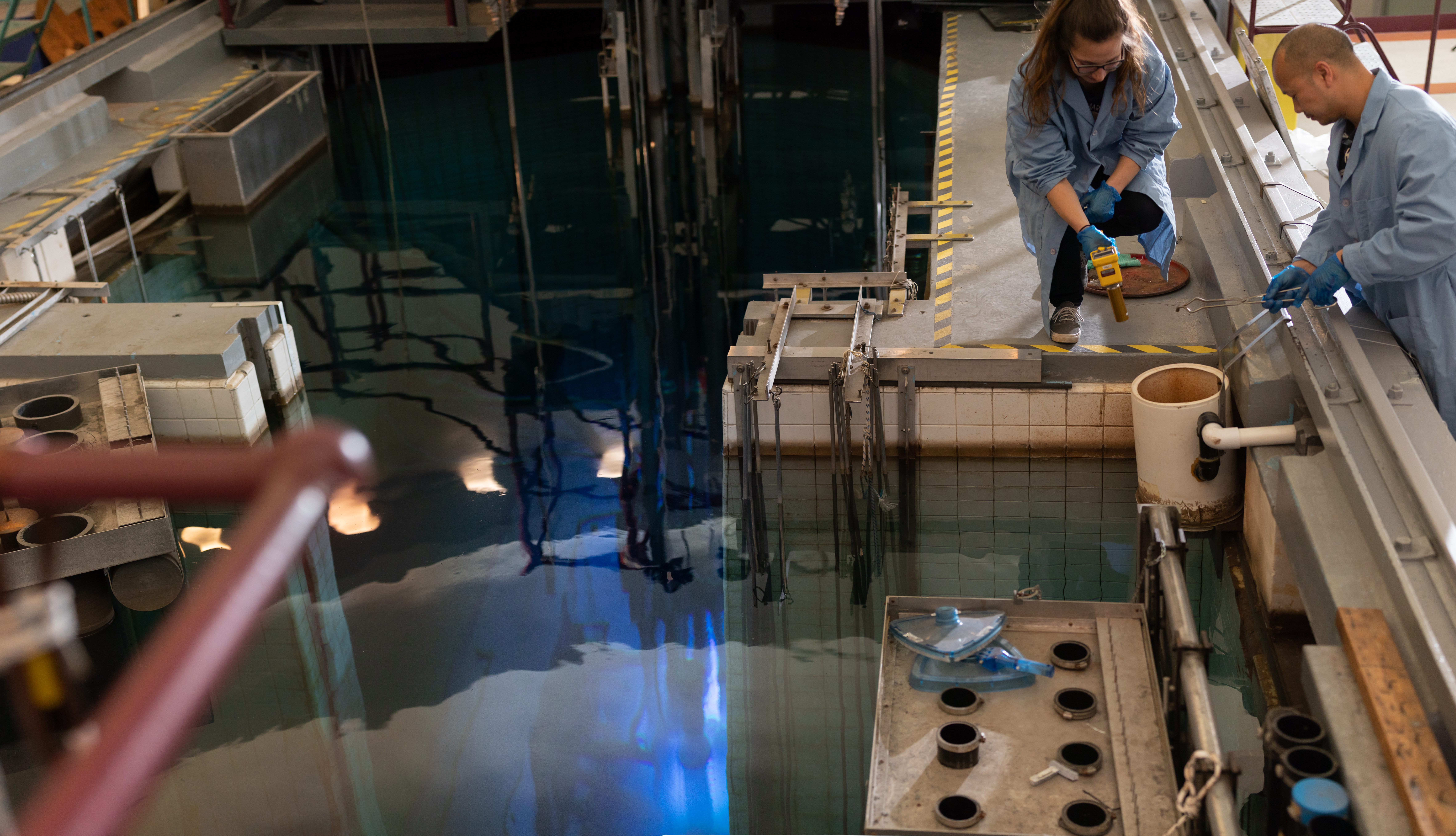
That sounds intense!
Oh, it was. More so because you weren’t always aware at the time why the training was structured in that way. But then, as you go on, you begin to realize that you can answer the questions without really needing to think about it. And then you understand that, in an emergency, there isn’t necessarily a lot of time to think. It all has to be second nature.
I have a story from when I was first interviewed for the job. I walked into the interview room and there were three managers and supervisors sitting behind the table waiting for me. All over the table were various valves, tools, and diagrams. It was quite an imposing sight to walk in to. They began by asking technical questions that were quite challenging. At one point there was a question about solving an issue if the instrument required breaks down. I tried to second guess the answer, but ultimately I didn’t know. Eventually one of the supervisors asked if I gave up. I begrudgingly said yes and asked what the correct answer was.
A few years later I happened to be talking with one of those supervisors about how I did on the interview. He let me know that the point of the question was not to see if I could answer it perfectly, but to see how I would respond under pressure. He was testing me for some of the top qualities we look for in reactor operators: how I would respond under stress, my willingness to learn and ask questions, and my ability to be honest about what I don’t know. Qualities you couldn’t always glean from a resume and an application.
“He was testing me for some of the top qualities we look for in reactor operators: how I would respond under stress, my willingness to learn and ask questions, and my ability to be honest about what I don’t know. Qualities you couldn’t always glean from a resume and an application.”
What got you interested in becoming an operator in the first place?
I went to Lambton College for a three-year diploma in Chemical Production and Power Engineering Technology. It was a program geared to get people into the oil refineries around Sarnia. Of course, about the time that I started, oil prices fell and the work started to dry up. I was lucky to get a Co-op position at Invista, which operated a co-generation plant in addition to their chemical manufacturing operation. Also, during one of my courses, I did a project on nuclear power generation which got me interested in the field. So, when I finished my diploma, I had already gone down the rabbit hole with respect to jobs in the nuclear industry. I found the MNR posting on one of the job boards I was frequenting at the time.
What do you like most about your job?
The people. If you have not been in the reactor building, it is a confined space with no windows and a lot of concrete, and you end up spending a lot of hours with your co-workers in a small control room. But everyone there went through the same training and working together that closely just builds camaraderie. You realize just how important it is to have a cohesive group that can work together to solve problems and deal with emergencies if they arise.
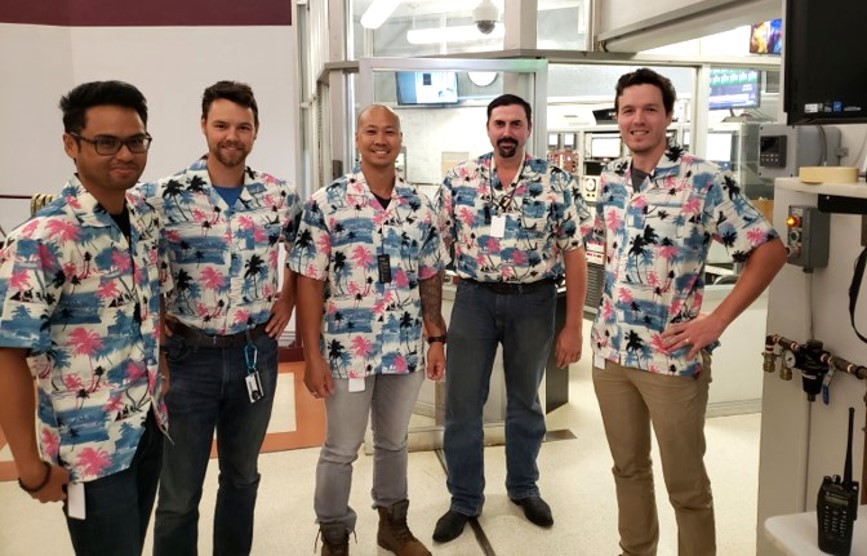
The other part that is great is just being in an environment where you are always learning. I find that the more I learn, the more I realize how there is always more to know. It’s a humbling experience. I get the same feeling being in charge of everything in the reactor. Being the operator in charge, and knowing that the buck stops with you, drives home the enormity of the responsibility that goes with driving an on-going nuclear reaction.
“I find that the more I learn, the more I realize how there is always more to know.”
Any cool projects going on right now that you’re involved in?
There are so many great things going on, especially in an open-pool research reactor. Since we aren’t focused on power generation, we are always irradiating samples [with neutrons] for industry and research testing, as well as making radioisotopes like I-125 and Ho-166 for cancer therapy. We’re also supporting modifications to Beam Port Four. We have six beam ports for various applications. For example, two supply neutron beams for a company, N-Ray, to analyze airplane turbines for defects. Beam Port Four is part of an initiative to supply a neutron beam to SANS, or the Small Angle Neutron Scattering facility. It will be used to study materials at the atomic level and will service twenty-five research groups at McMaster and from other institutions, and is part of Canada’s long-term neutron strategy.
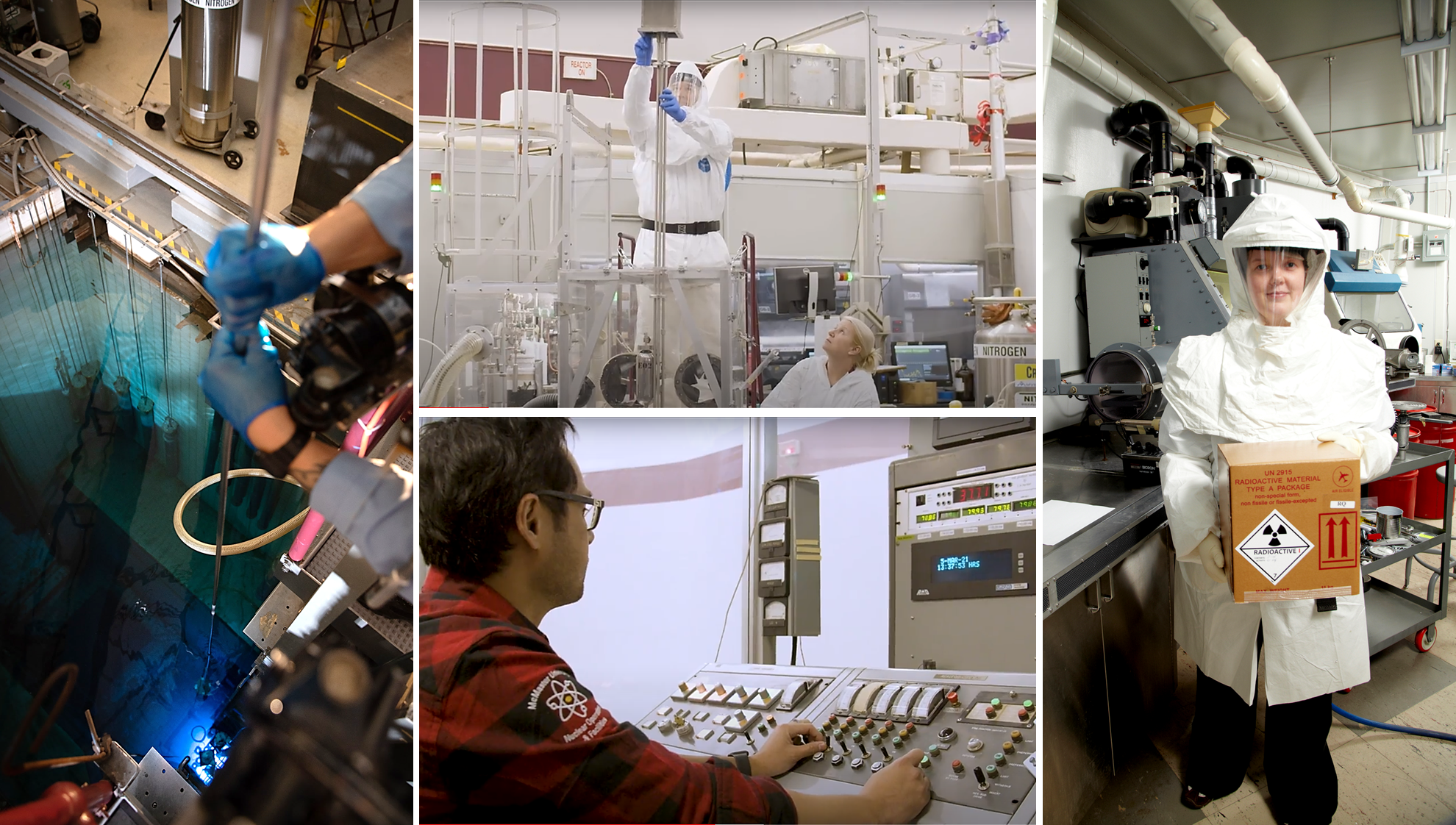
What are some memorable experiences during your time with NO&F so far?
Passing my licensing exam and becoming a CNSC certified Reactor Operator. It was divided into multiple sections which included reactor physics, operational safety, reactor operation, and health physics to name a few. It was a huge personal achievement, after all of the hard work and stress that came with it.
Also, being part of the team that won the President’s award for outstanding service in 2020. This was during the peak of the pandemic, and we were able to maintain the crucial lifesaving medical isotope supply worldwide. It was a challenging time for everyone, so it was nice to be acknowledged.
And, as I said before, the people make it such a great place to work. So, work functions are always a blast. We do an annual golf day, as well as company BBQs and other events. When MNR had its 60th anniversary, we had an awesome event to celebrate the occasion.
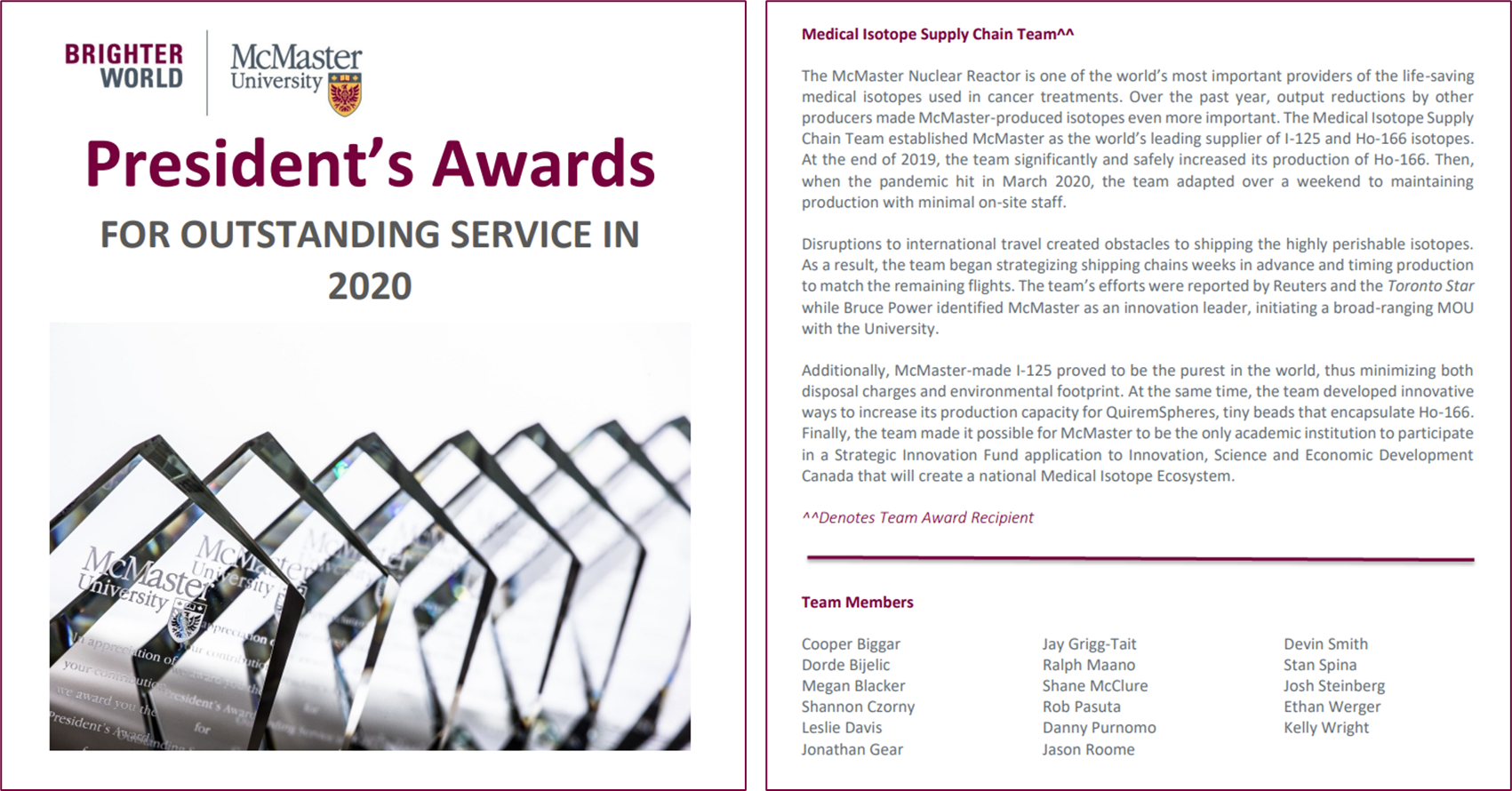
Any advice for someone thinking about a career in nuclear?
Really, getting into nuclear comes from a desire to get into the industry. There are so many resources online that can help you learn about it, and who to talk to about a career path. If anything, we need to have more nuclear education at the elementary and high school levels as we leverage nuclear power to get us to net zero. And definitely take a trip to visit our Reactor. Tours are back on, and it is one of the most accessible [nuclear] facilities in Canada.
